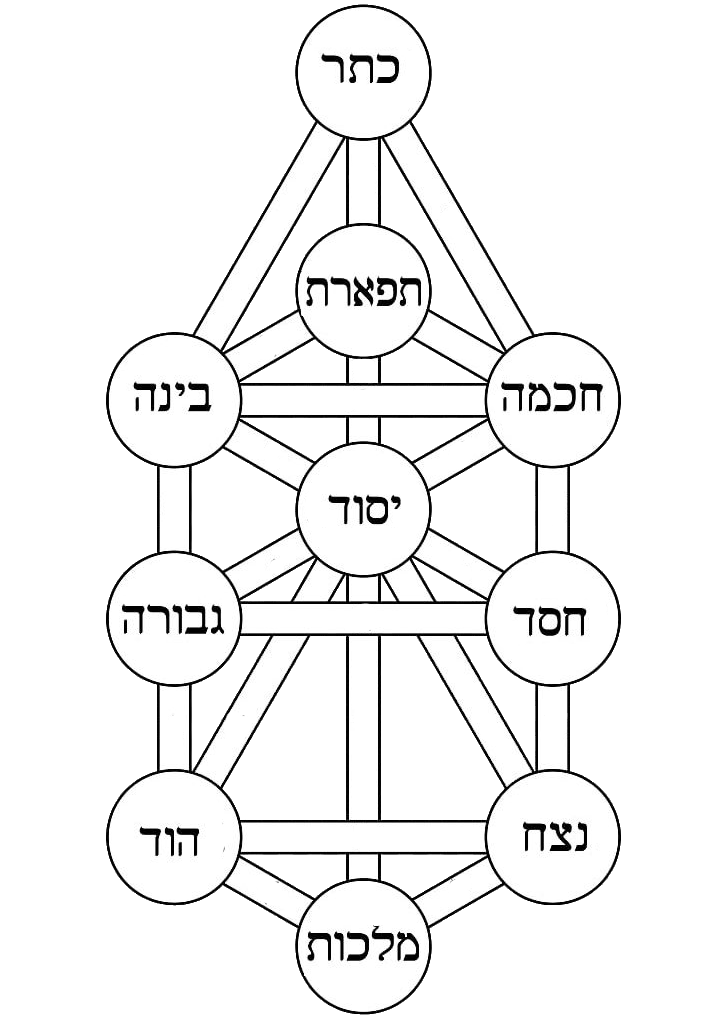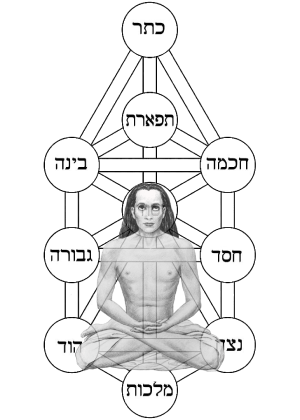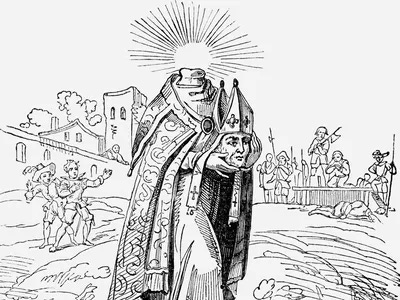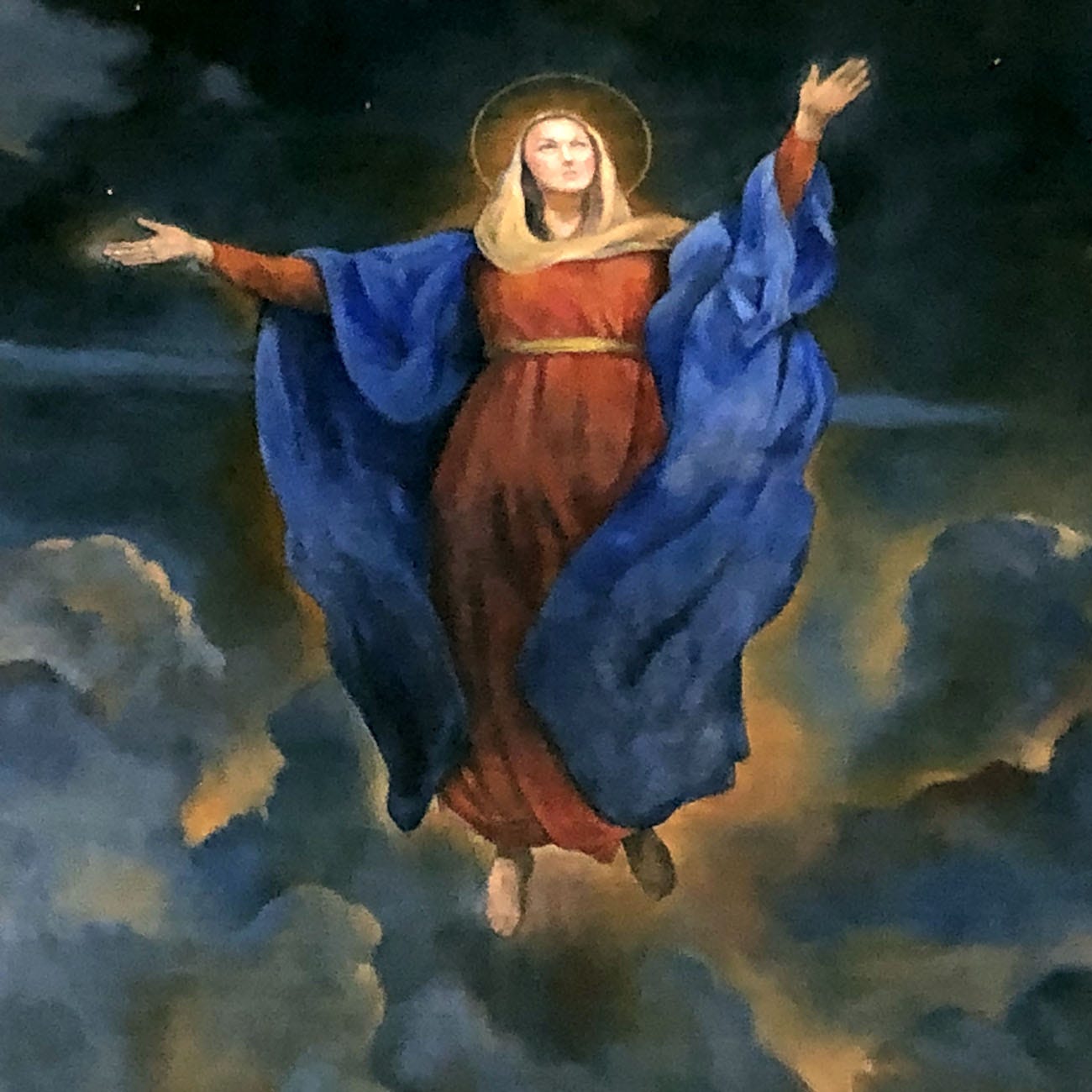This is part 3 of a series. Read Part 1. Read Part 2.
“What is most spiritual always takes place in the most corporeal.”1 - Louis-Marie Chaucet
“That which is like poison at first, but in the end like nectar, that ‘pleasure’ is declared to be sattvic (pure), born of the purity of one's own mind, due to Self realization.” The Holy Geeta 18.37
Here is an image I can barely articulate. I feel like I’m straying into dangerous territory. It presumes knowledge of what I myself am not, but I would say it is an image of what I hope to be. The following is what Tolkien might call “eucatastrophe” — a sudden but favorable ending. For example, the ego does not experience its own death as anything but a catastrophe, but for the soul, the ego’s death is beneficial. Please take this as the conjecture of a soul looking out on the coasts of utopia.
In this third configuration, we transcend Eden. One’s erotic lunacy (mania erotica) Yesod migrates even higher than the heart and now permeates Da’at, where one’s desire is to glorify God and to enjoy Him forever is by knowing Him ever more. As Adam “knew” his wife Eve, here our knowledge itself is no longer merely dead head knowledge about things, nor even merely felt knowledge-at-a-distance but becomes erotic union with the Divine, theosis.
To be in but not of the world is to be a transcendental transient, a holy hobo.
The heart of our attention, Tiphareth, rises into the supernal kingdom heaven, having crossed the abyss on a camel in total spiritual detachment (“poverty”). No man rich in anything — including moral accomplishment or even knowledge — ever crossed that chasm. Only a camel can pass the abyss safely.
Jesus said to him, “If you would be perfect, go, sell what you possess and give to the poor, and you will have treasure in heaven; and come, follow me.” When the young man heard this he went away sorrowful; for he had great possessions. And Jesus said to his disciples, ‘Truly, I say to you, it will be hard for a rich man to enter the kingdom of heaven. Again I tell you, it is easier for a camel to go through the eye of a needle than for a rich man to enter the kingdom of God.’ When the disciples heard this they were greatly astonished, saying, ‘Who then can be saved?’ But Jesus looked at them and said to them, ‘With men this is impossible, but with God all things are possible.’”2
Gimel ג is the Hebrew letter that marks the path from the heart to the crown. It is the story of the rich young ruler, the false king of the ego and its prowess, accomplishments, and virtue. The paradox of celestial heights is that heaven has no virtuous men in it — only repentant sinners. “[N]o Christian saint has ever considered himself otherwise than as a great sinner.” 3 It is the man who has no place to rest his head who may be closer to the kingdom of heaven than the upstanding “competent” citizen. It is not the moralistic or the enforcers of morality on others that Christ promises the world to come. To be in but not of the world is to be a transcendental transient, a holy hobo. Anything we can merit is transient, and anything we can possess is even less real. Our accumulation of wealth, accomplishment, ad knowledge is worthless if not imbued with love. The prophet Isaiah writes, “We have all become like one who is unclean, and all our righteous deeds are like a polluted garment.”4
With the heart transposed into the kingdom of heaven, the saints gain their ground and, in the same instant, lay down their crowns before the throne, and thus, Kether, too, is displaced upwards. The saint now begins to appear no longer as an accomplished man of business, or even an erudite scholar, or even a pious contemplative, but rather a holy fool.
“There is another way, that of ‘sunstroke’, namely the annihilation of intelligence by the brilliance of wisdom, which is the theme of the twenty-first (or zero) Arcanum ‘The Fool.’”5
When St. John the Evangelist’s disciple Polycarp was challenged to say, “Away with the atheists” and he would be allowed to go free — notably, it was the Christians who were called atheists by the Roman polytheists — Polycarp gestured towards the leering mob and, clearly indicating them instead, said, “Away with the atheists!” Needless to say, he was not spared from being burned at the stake.
Who can go into heaven singing as the Hasidim did on their way to the gas chambers of the holocaust? Only someone whose bodily form is already almost entirely spiritualized. The space above Malkuth is hollowed out for the saint and becomes a beacon of spiritual beauty. By being totally empty, we become the conscious temple of the Shekinah. No longer is the inner flame hidden under a bushel. We become all fire.
“[The] elders fall down before him who is seated on the throne and worship him who lives for ever and ever; they cast their crowns before the throne, singing,
‘Worthy art thou, our Lord and God,
to receive glory and honor and power,
for thou didst create all things,
and by thy will they existed and were created.’”6
Tiphareth remains connected to Chokmah, Binah, and Kether.7 Here, I attempt to map stages of regeneration when the center of an individual’s heart changes: from subjective feelings and how the lower organism makes one feel to the head and how knowledge of God illuminates feeling from above. But the intellect cannot enter the Kingdom of Heaven. The intellect waits outside the gates of heaven in the “cloud of knowing” and humbly tries to organize what indirect glimpses it catches. This may well be called ridiculous. But I’m not trying to innovate. I’m trying to paint a dynamic picture of experience.


Just as you do not pour new wine into old wineskins, lest they burst, we cannot tolerate the unfiltered presence of divinity until our physical organism has been fully spiritualized to be able to receive that fullness. Lazarus — by some accounts the “beloved disciple” who was raised to become John the Evangelist — dies in Tomberg’s imagination by slipping out of his body in an uncontainable spiritual ecstasy:
“Now what happened to Lazarus was a radical conversion from the earthly to the heavenly gravitational field. His sickness lay in the fact that the long process of conversion over decades, which the desert fathers experienced, was in his case, shortened to a few weeks and days. The intensity was so great that the body could not keep pace with it; he was overwhelmed by the measure of the spirituality to which he had to convert. He succumbed. So it happened that Lazarus died.”8
We shouldn’t seek a quick transformation, but rather daily “work out our salvation with fear and trembling” and slowly progress as a receptacle of the Shekinah. Shortcuts lead to short circuits. But when we are properly prepared for the celestial world, we do not perish as Lazarus did, but merely “die to self” and live on earth as it is in heaven.
For a saint — reborn from above — the space originally occupied by Tiphareth is vacated.9 Only perfect emptiness can contain perfect fullness. The erotic self-containment of Yesod has migrated to the domain of Da’at, where cognition itself is experienced as an erotic union. Tiphareth, migrating to the former domain of Crown, makes an incognizable spiritual beauty as the center of the soul. All that is not understood in life becomes experiences as an ineffable beauty because the poetry of all existence becomes truly felt.

The joy of spiritual beauty is not shallow stimulation of external sensory pleasure nor the subjective affinities of the familiar habits of the soul, but rather the harmony of the All in All inasmuch as all things that belong to a vast — albeit ineffable — design. From God’s perspective, even suffering is perfect because it leads to something much greater. God allowed the fall so we might rise even higher than our beginning.
The Blessed Virgin Mary is the prime example of the soul submitting freely and without deviation from the Divine. At her death, she leaves behind nothing but the scent of lilies. The prophets Enoch and Elijah likewise were taken directly into heaven, death being no more to the saints than removing clothing. Other saints approach this, leaving behind an “odor of sanctity” and (relatively) incorruptible corpses.10 Sophia was there from the beginning, she was the first act of creation, the generated nihilo (tzimtzum) within which all things could exist. From the first instance of her creation, Sophia always said “Let it be to me as you will” and the apparent indifferent of matter (cognate with mater) is benevolent love. For, a free God of Love cannot coerce us into loving him. If our love is not given to God freely and without compulsion, he cannot accept it. In Mary, Sophia, the Mother of All, became realized as her own daughter in the Immaculate Conception. After all, who but Sophia could bear the Logos within her without being destroyed? When our own souls become emptied, we become a microcosmic star in the sea of Sophia.
This is the difficult promise of an open heart: life will hurt more, not less.
As an embodiment of the unfallen Edenic Tree of Life, the Blessed Mother does not die normally but returns body and soul to heaven, being entirely spiritualized before death. It is through her that we pass into the supernal tree. This is not because her life was easy. She knew her heart would be pierced with a sword, and it was. Those who die without karmic debts (unforgiven sins) bypass the fires of purgatory because they already went through them here on earth.
Our “aim is to understand and advance the work of the alchemical transformation of the spirit, the soul, and matter, from the state of primordial purity before the Fall, to the state after the Fall, and from the latter to that of the Reintegration (the fulfillment of salvation). . . ”11 Our reintegration is intended to higher than Adam’s original paradisical condition. We neither regress to a subhuman reptilian contentment nor return to an Edenic state. Our only way up is beyond.
This is the difficult promise of an open heart: life will hurt more, not less. The fruit of spiritual regeneration is more pain yet greater joy. More bitterness, yes, but bitterness outpaced by ever more celestial sweetness. If our lives do not appear as “foolishness to the world,” we must question how much wisdom of God we really possess. Let us welcome the aurora of that supernal sunrise in this world and the next.
“[T]he day shall dawn upon us from on high to give light to those who sit in darkness and in the shadow of death, to guide our feet into the way of peace.”12
This piece is Part 3 of a series. Read Part 1. Read Part 2.
Setting Yourself On Fire (part 1)
“The organ through which we see God is love.” - Simone Weil, Notebooks I used to get horrible migraines as a child and early teenager. Most of my biological family shared this chronic problem. I remember one migraine in particular, where my family was visiting the zoo. The stench of the place triggered something terrible. I stayed behind in the unaircond…
That Unquenchable Fire (part 2)
Read Part 1 here. “An altar will I construct from my shattered heart. The shards of my spirit are my offerings to You.”False Mirror is a reader-supported publication. To receive new posts and support my work, consider becoming a free or paid subscriber.
Louis-Marie Chauvet, The Sacraments, xvii
Matthew 19:16-26
Valentin Tomberg, Meditations on the Tarot, Letter X
Isaiah 64:6
Ibid.
Revelation 4:10:11
Perhaps Tiphareth’s paths in this new position should extend further downward to the Hod and Netzach? That would be tidier, but it does not speak to me at this point.
Valentin Tomberg, Covenant of the Heart, pp. 72-73
This is why the belief in reincarnation is irrelevant to regeneration: the steps are the same, whether we take them all in one lifetime or in ten thousand. Many who believe in reincarnation do nothing but settle into ever-more calcified habits, repeating what is familiar from past lives. And many who know nothing of reincarnation ascend to the next world.
The visionary agronomist Carey Reams suggests that truly healthy fruits and vegetables do not rot but rather spontaneously dehydrate.
Valentin Tomberg, Meditations on the Tarot, Letter XXI, The Fool, pg. 621
Luke 1:78-79



